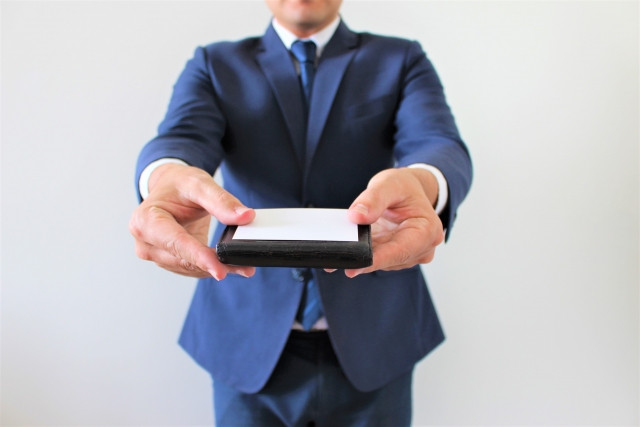Business cards can be seen as an extension of yourself in Japan, and there are set standards of doing things. Exchanging business cards is simple diplomacy that, in light cases, can affect people’s perception of you, and in extreme cases, may decide the weight of future transactions and cooperation.
Table of Contents
- Importance of Business Cards in Japan
- Business Card Exchange Etiquette
- Additional Business Card Tips
- Seal the Deal
 Are you having any issues with job-hunting in Japan?
Are you having any issues with job-hunting in Japan?
Importance of Business Cards in Japan
In this era of advanced technology, we mostly create connections through the internet. We just simply exchange our social media accounts with our newfound acquaintances, and you can immediately contact one another anytime, anywhere.
This, however, is not the case when it comes to the business world in Japan. If you are a foreigner and are coming to Japan to make important transactions and other business-related deals, or if you have just joined a Japanese company, you must keep in mind how important business cards in Japan, called 名刺 meishi, are. Exchanging business cards (the 名刺交換 meishi-koukan) in Japan is not just a mere act of formality, but it is actually a significant part of the process in giving a great first impression. Your business card is part of your identity in Japan, and exchanging business cards is the first step in making a connection between you and the other person, and it is essential in starting a conversation.

In fact, there is a certain etiquette and set of rules to be followed when giving and receiving business cards. Failure to abide by these rules could cost you a deal. Foreigners might be given a little consideration, but trying to follow the rules will certainly give you more advantages in your business ventures. After all, it’s always better to surprise and impress the other party than to be forgiven as the “clueless foreigner”.
What your card should have
Some of the important reminders in creating and presenting your business card are:
-
It can be simple as long as it is formal. Do not put unnecessary designs that will overshadow the important details on the card.
-
Make sure that the name, company, and position are clear and easy to read. Use simple and professional fonts. The position is particularly important, as it’s used to figure out who has a higher status, which will be essential in the exchange.
-
It will be more appreciated if your business card has both English and Japanese translations, usually with English on one side and then Japanese on the other. Dual-sided cards give the impression that you are earnest about working in Japan, and they help build trust as well.
-
Business cards should be neat and in proper condition. Any smudges and folded corners on your business cards could be worse than having no business card at all, as they show a lack of care and attention.
Writer's Pick
Business Card Exchange Etiquette
It’s important to try to master the process of exchanging business cards in Japan. If you plan to work on a deal with a Japanese company, or simply exchange cards with prospective customers in the future, or even just merely exchange of business cards to a colleague, be mindful of the etiquette. Do you know that a Japanese businessman has mastered this skill of "meishi-koukan"? New employees fresh out of university in Japanese companies are specifically given training in order to keep the company from losing face due to improper etiquette. It may be best to ask someone to show you how to do it properly and practice before you have to do it for real. Here are some guidelines:
Presenting the Business Card Properly

-
Bow as a sign of respect.
-
Hold the corners of your card with your two hands. Do not cover any information on the card.
-
Make sure the card is facing the recipient so that they can read what’s on the card.
-
If you are using a dual-sided card, the Japanese side must be on top.
-
You may also give a brief self-introduction mentioning your name and company right before or as you give your card. If possible, try to learn some basic introduction words and phrases in Japanese that you can use during the business card exchange because your Japanese counterparts will definitely appreciate your effort.
Examples you can say:
“Hajimemashite.”
Pleasure to meet you.
“(Company name) no (your name) to moushimasu.”
I’m (name) from (company).
“Yoroshiku onegai itashimasu.”
I look forward to working with you.
Receiving the Business Card Properly
-
Bow together with the person presenting the business card.
-
Receive the cards by holding the corners with your two hands.
-
Take time to check out the card and study what is written on it. Admire the wording, font, and design as a sign of appreciation. Confirm the name of the presenter and say thank you.
-
After an ample time of appreciation, you can place the card properly on the table if seated for a meeting, which is helpful to remember their names if arranged in front of you by seating arrangement, or otherwise put it away carefully in your business card holder.
-
When placing the business cards on a meeting table, you can either arrange them based on the seating order or based on the status, ranking, and seniority.
Dos
-
Before the exchange, make sure that your business cards are already prepared. Searching for your business card in front of a person is considered rude.
-
Do remember the sequence of business card exchanges. The person with higher status must present the card first before the other with a lower position. If you are unaware of who’s who, the visiting person is usually the first one to initiate the exchange.
-
Maintain eye contact when exchanging business cards and smile, especially when they introduce themselves.
Don’ts

-
Do not just immediately stuff the business card somewhere out of sight after you receive it because it is considered disrespectful. Take a moment to appreciate it first.
-
Do not write anything on the business card because it is considered extremely rude. The information you need is already printed on the card.
Additional Business Card Tips
-
Get yourself a nice and presentable business card case or holder. Having a separate cardholder makes your business cards more accessible and well-kept, as well as professional. Sometimes, just using your wallet shows that you are not taking matters so seriously and not putting much importance on the other person and to the transaction.
-
It is always better to bring more business cards. Knowing the persons you need to meet beforehand can also help so that you can identify how many business cards you need. But, make sure to bring extra ones in case of an emergency.
-
Make sure that your business cards are of good quality from the paper to the print in order to create a good impression.
-
If you are going to make a dual-faced business card, make sure that the translation is accurate by using qualified translation services. Online translations such as Google Translate are not reliable.
Seal the Deal

Business cards play a huge part in the business world, especially in Japan. There are many rules and guidelines that you should follow in order to show respect and formality. As a foreigner, you may not be expected to perfect these steps but making the initiative to follow them is highly appreciated. And remember, your business card serves as your first impression, and your behavior during the business card exchange could either help you seal or lose the deal.

































